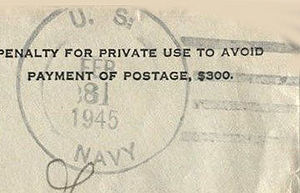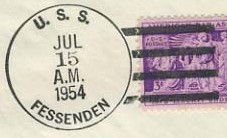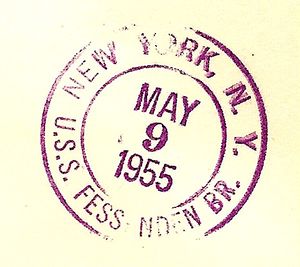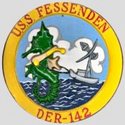FESSENDEN DER 142
Ship Name and Designation History
This section lists the names and designations that the ship had during its lifetime. The list is in chronological order.
This section lists active links to the pages displaying covers associated with the ship. There should be a separate set of pages for each name of the ship (for example, Bushnell AG-32 / Sumner AGS-5 are different names for the same ship so there should be one set of pages for Bushnell and one set for Sumner). Covers should be presented in chronological order (or as best as can be determined).
Since a ship may have many covers, they may be split among many pages so it doesn't take forever for the pages to load. Each page link should be accompanied by a date range for covers on that page.
- Covers Page 1 (1945-54)
Postmarks
This section lists examples of the postmarks used by the ship. There should be a separate set of postmarks for each name and/or commissioning period. Within each set, the postmarks should be listed in order of their classification type. If more than one postmark has the same classification, then they should be further sorted by date of earliest known usage.
A postmark should not be included unless accompanied by a close-up image and/or an
image of a cover showing that postmark. Date ranges MUST be based ONLY ON COVERS IN
THE MUSEUM and are expected to change as more covers are added.
>>> If you have a better example for any of the postmarks, please feel free to replace the
existing example.
|
Postmark Type |
Date From to Date To |
Thumbnail Link To Postmark Image |
Thumbnail Link To Cover Image |
|---|
1st Commissioning August 25 1943 to June 24 1946
|
Locy Type |
1945-02-08 |
 |
|
As DE-142
2nd Commissioning March 4 1952 to June 30 1960
|
Locy Type |
1954-07-15 |
 |
 |
As DER-142
|
Locy Type |
1955-05-09 |
 |
 |
Note:
Other Information
FESSENDEN received two battle stars for World War II service
Awards, Citations and Campaign Ribbons...
Combat Action Ribbon (retroactive) - American Campaign Medal - European-Africa-Middle East Campaign Medal w/ 2 stars - WWII Victory Medal - National Defense Service Medal
NAMESAKE - Reginald Aubrey Fessenden (October 6 1866 - July 22 1932)
At the age of fourteen, Bishop's College School in Lennoxville, Quebec granted Fessenden a mathematics mastership. In late 1886, Fessenden began working directly for Thomas Edison at the inventor's new Laboratory in West Orange, New Jersey. Fessenden quickly made major advances, especially in receiver design, as he worked to develop audio reception of signals. From 1890 to 1900, Fessenden worked at several manufacturing companies and became a professor of electrical engineering at Purdue University in 1892 and then chair of the electrical engineering department of the University of Pittsburgh in 1893. By 1900, Fessenden was working for the United States Weather Bureau where he evolved the heterodyne principle where two signals combined produce a third audible tone. While there, Fessenden, experimenting with a high-frequency spark transmitter, successfully transmitted speech on December 23 1900 over a distance of about one mile, which appears to have been the first audio radio transmission.
On December 21 1906, Fessenden made an extensive demonstration of the new alternator-transmitter at Brant Rock, showing its utility for point-to-point wireless telephony, including interconnecting his stations to the wire telephone network. A few days later, two additional demonstrations took place, which appear to be the first audio radio broadcasts of entertainment and music ever made to a general audience. On the evening of December 24 1906, Fessenden used the alternator-transmitter to send out a short program from Brant Rock, which included his playing the song "O Holy Night" on the violin and reading a passage, Luke Chapter 2, from the Bible. On December 31, a second short program was broadcast. The main audience for both these transmissions was an unknown number of shipboard radio operators along the Atlantic Coast. Although now seen as a landmark, these two broadcasts were barely noticed at the time and soon forgotten. His great contributions in the field of radio were of marked benefit not only to the Navy but to all seamen. He died July 22 1932, at his home on Bermuda
If you have images or information to add to this page, then either contact the Curator or edit this page yourself and add it. See Editing Ship Pages for detailed information on editing this page.
Copyright 2024 Naval Cover Museum

